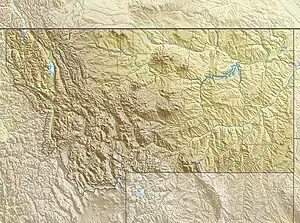| Whitefish Lake | |
|---|---|
| epɫx̣ʷy̓u (Kalispel-Pend d'Oreille) | |
 View from Whitefish Lake State Park beach looking north to Whitefish Mountain Resort in autumn, courtesy Mike Koopal | |
 Whitefish Lake  Whitefish Lake | |
| Location | Flathead County, Montana |
| Coordinates | 48°27′04″N 114°22′53″W / 48.45111°N 114.38139°W |
| Primary outflows | Whitefish River |
| Basin countries | United States |
| Max. length | 5.8 miles (9.3 km) |
| Max. width | 1.4 miles (2.3 km) |
| Surface area | 5.2 square miles (13 km2) |
| Average depth | 82 feet (25 m) |
| Max. depth | 233 feet (71 m) |
| Residence time | 2.6 years |
| Shore length1 | 15.9 miles (25.6 km) |
| Surface elevation | 2,999 feet (914 m) |
| Settlements | Whitefish, Montana |
| References | [1][2] |
| 1 Shore length is not a well-defined measure. | |

Whitefish Lake ; (Salish: epɫx̣ʷy̓u[3]) is a natural oligotrophic freshwater lake in Flathead County, Montana, United States.
History
Whitefish Lake was named in the 1850s for the abundant mountain whitefish (Prosopium williamsoni) harvested there.[4] The Salish referred to the lake as epɫx̣ʷy̓u, "has whitefish".[3]
Geography
Whitefish Lake is located northwest of the city of Whitefish, Montana, at an elevation of 2,999 feet (914 m).[1] It lies between the southwest flank of the Whitefish Range and the northeast flank of Lion Mountain[5] in Flathead County. This natural 5.2 square miles (13 km2) lake has a maximum length of 5.8 miles (9.3 km) and width of 1.4 miles (2.3 km), and is 233 feet (71 m) at its deepest. Whitefish Lake has a surface elevation of 2,999 feet (914 m) and occupies a surface area of approximately 5.2 sq mi (13 km2).[6]
Tributaries to the lake include Swift Creek, which originates in Upper Whitefish Lake, and Lazy Creek, which enter at the northwestern head of the lake, and Hellroaring Creek on the eastern shore, and Beaver Creek which begins in Beaver Lake on the western shore. The lake has approximately 15.9 miles (25.6 km) of shoreline.[2]
The lake's outflow is the Whitefish River, which is a tributary to the Stillwater River, which flows into the Flathead River about 1 mile (1.6 km) east of Kalispell.
Ecology
Bull trout (Salvelinus confluentus) and westslope cutthroat trout (Oncorhynchus clarki lewisi) were the apex predator and pelagic surface feeder, historically, in Whitefish Lake. They persist in the lake but in greatly diminished numbers. The primary threat to native cutthroat trout is hybridization with non-native rainbow trout (Oncorhynchus mykiss).[2] Other native fish species include the river's namesake mountain whitefish, largescale sucker (Catostomus macrocheilus), longnose sucker (Catostomus catostomus), northern pikeminnow (Ptychocheilus oregonensis), peamouth chub (Mylocheilus caurinus,), redside shiner (Richardsonius balteatus), fathead minnow (Pimephales promelas), and mottled sculpin (Cottus bondi) slimy sculpin (Cottus cognatus), and shorthead sculpin (Cottus confusus).
The lake's fish assemblage has been almost completely disrupted by twentieth-century introductions of non-native fishes and mysis shrimp (Mysida). Introduced non-native fish species include northern pike (Esox lucius) which preys on native trout species. Kokanee salmon, the landlocked form of sockeye salmon (Oncorhynchus nerka), were introduced to the lake in 1945 and spawned successfully for 35 years until competition for forage with introduced Mysis shrimp and predation from lake trout extirpated the kokanee. The rise in Mysida populations led to an increase in non-native lake trout (Salvelinus namaycush) numbers, the latter competing with bull trout and a predator of almost every native fish species in the lake. Non-native rainbow trout (Oncorhynchus mykiss) and brook trout (Salvelinus fontinalis) have also been introduced and compete with native bull and cutthroat trout. Introduced lake whitefish (Coregonus clupeaformis) are now abundant in the lake.[2]
Recreation
Fishing, kayaking, and boating are major recreational activities on the lake. Whitefish Lake State Park provides opportunities for camping, boating, and swimming, as does Whitefish City Beach, a sandy beach at the lake's outlet in the city of Whitefish.
See also
References
- 1 2 "Whitefish Lake". Geographic Names Information System. United States Geological Survey, United States Department of the Interior.
- 1 2 3 4 Whitefish Lake Institute (2015). Whitefish Area Water Resources Report: A Status of the Whitefish Lake Watershed and Surrounding Area (PDF) (Report). Montana Department of Natural Resources and Conservation. Retrieved 2019-01-06.
- 1 2 Tachini, Pete; Louie Adams; Sophie Mays; Mary Lucy Parker; Johnny Arlee; Frances Vanderburg; Lucy Vanderburg; Diana Christopher-Cote (1998). nyoʻnuntn q̓éymin, Flathead Nation Salish dictionary. Pablo, Montana: Bilingual Education Department, Salish Kootenai College. p. 161.
- ↑ Rich Aarstad; Ellen Arguimbau; Ellen Baumler; Charlene L. Porsild; Brian Shovers (2009). Montana Place Names: From Alzada to Zortman. Montana Historical Society Press. ISBN 978-0975919613.
- ↑ "Lion Mountain". Geographic Names Information System. United States Geological Survey, United States Department of the Interior.
- ↑ Report on Whitefish Lake, Flathead County, Montana - EPA Region VIII Working Paper No. 804 (Report). National Eutrophication Survey (Office of Research & Development, U.S. Environmental Protection Agency). 1977. Retrieved January 6, 2019.